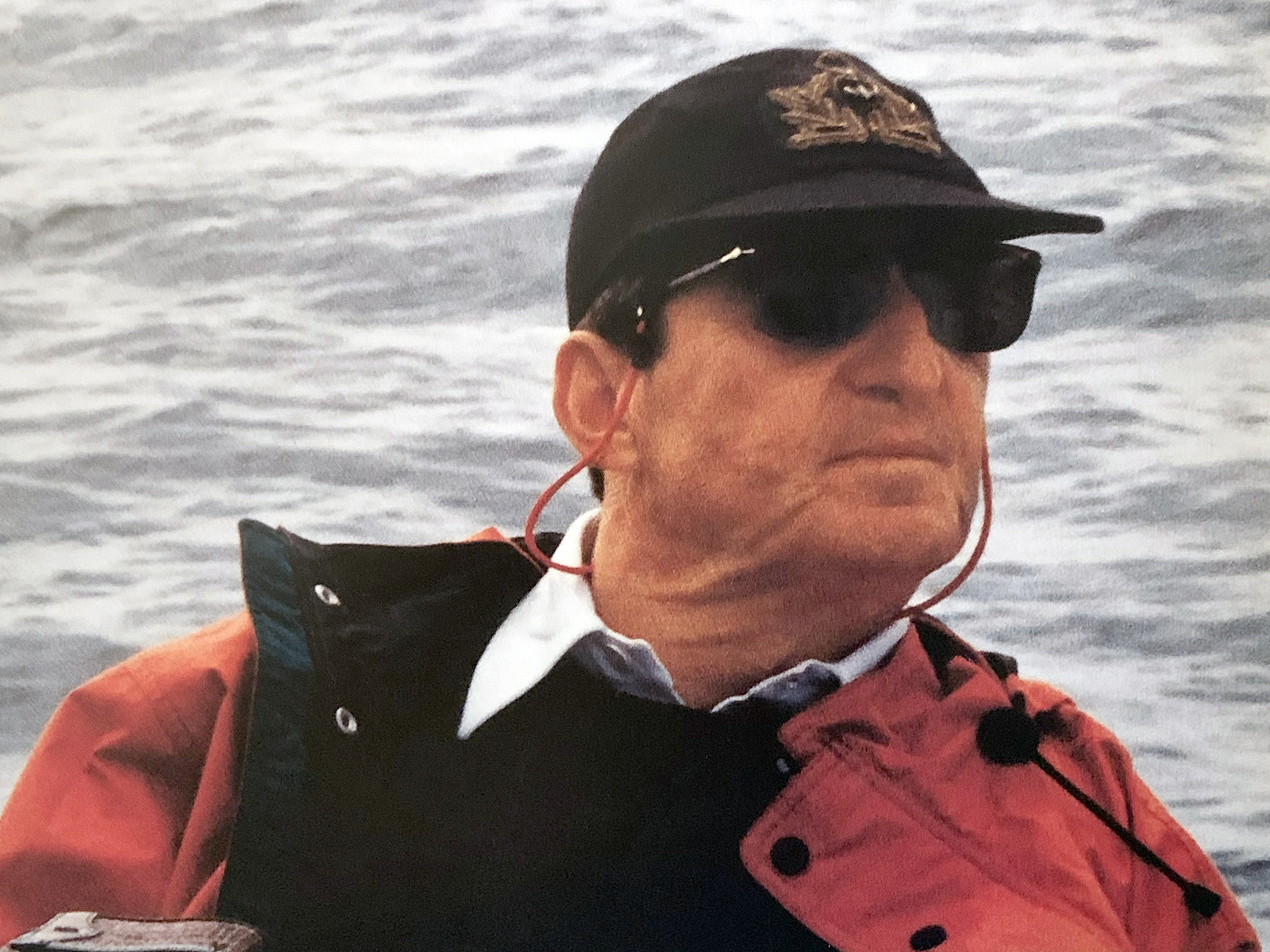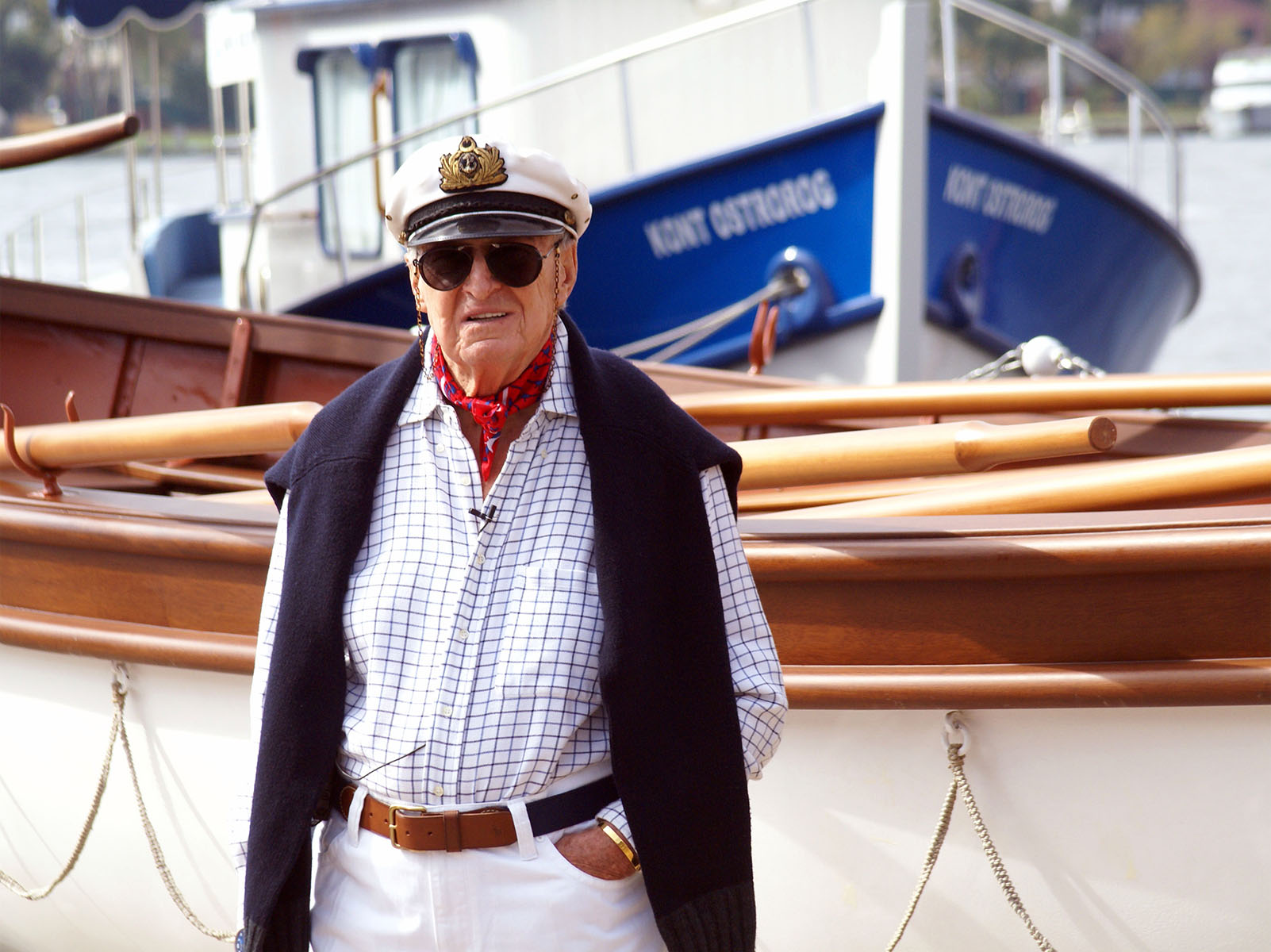We are their supporters, they are our pride
One of the most well-known aspects of Rahmi Koç is his boundless passion for the sea. This passion, which started at a young age on the fishing boats of Büyükdere, turned into a trip around the world on the Nazenin IV. The items and objects collected from different corners of the world become a huge museum. However, he never strays away from practical boat life. He thinks about boat life, takes notes on boat manners and is happy to share them. In this article, you will read the notes Rahmi M. Koç took for captains and sailors in his unique and subtle style.

- One person is ultimately responsible for each yacht. This person's real duty starts after the boat returns from the voyage and is moored;
General cleaning,
Maintenance of any equipment or devices that have malfunctioned during the voyage,
If spare parts are to be purchased, ensuring that they are purchased with the correct name and part number.
- If electricians, electronics or craftsmen are coming for maintenance, make an appointment with them on time and ensure their arrival,
- Preferably, both the main engine and outboard engines should be full, and if this is not possible, 3/4 of them should be full,
- To ensure that the tools and equipment on the boat are clean, organized and complete,
- Keeping electrical, water and electronic diagrams ready to show to the coming technicians and boat plans ready and complete to show to the carpenter,
- Keeping engine, generator, transmission maintenance and construction catalogs at hand,
- If there are sail or awning repairs, completing them during the week,
- Maintenance of rubber boats and outboard motors, polishing of boards, oil and gasoline,
- After putting things in order, proceeding to the general cleaning of the boat, varnishing and painting on time,
- To prepare the material to clean the deck and teak, if any, without damaging them,
- Each boat must have 2 horseshoes, a lantern in the center of the lifebuoy and must be in working order. (It would be good if the name of the boat is written on the buoys).
- Big boats should have a lifeboat (inspected every year), two long sticks (perpendicular to the sea so that they can be seen from a distance) and life jackets to throw to those who fall overboard.
- On sailboats, a safety harness to tie yourself up in bad weather,
- Depending on the size of the boat, the first aid box should contain at least seasickness, headache, constipation, diarrhea, pain relievers, antibiotic pills, wound cleaning, burn medication, drops for ear and eye pain, toothache reliever, fracture stabilizer boards, plenty of gauze and bandages. A cream against dangerous sunburns would be good too.
- It is necessary to always have 3-4 flashlights on board, to make sure that their batteries are fresh and to maintain them. It is necessary to ensure that one light is on the sailor and one light is on the boss.
- If there is a radio, walkman, E1 VHF, it should be ensured that the batteries or charges are complete.
- Some of the sailors have the custom of sleeping in the cabin of the boss when he is not present. This is an absolute shame and must not be done.
- When the boss is absent, sailors should not fill the boat with their cronies, they should not overdo anything.
- If there is brass, either polish it every day or varnish it.

- Stainless steel needs to be wiped, Vaseline applied and prepared.
- 2 days before sailing, if cooking is done with LPG gas, their cylinders must be full and on deck. It is necessary to check the valves well.
- Standard drinks as well as the type of drinks that the boss and his guests like should be provided.
- If the yacht owner is to bring foodstuffs before sailing, to give him an additional list if necessary, to check the arrival and placement of the materials.
- It is essential to always have canned food and foodstuffs on board.
- If going on a long voyage, ensuring that the ship's papers are complete (Wallet, port papers, driver's licenses, etc.)
- If going abroad, to prepare the flags of the countries to be visited, to take a spare Turkish flag (always a foreigner wants it, it would be a good gesture); if the yacht owner has a flag, to have it ready; to ensure that the flag to be attached to the stern of the boat is of the proper size (one inch flag size for each foot of length on yachts).
- Ensuring that passports contain visas for the countries of destination.
- Preparing your own clothes in sparkling condition: 1 overalls, 1 raincoat, 1 windbreaker, top and bottom boots, 1 cap, 3-4 shorts, 1 jean, loose t-shirt, 1 woolen sweater with a neck, 1 boat and 1 non-boat shoes (Flip flops should never be worn); if the boss provides uniforms, great, if not, prefer dark blue and khaki colors (white is very nice, but gets dirty quickly).
- If the destination is known by heart, there is no need for a map. It is necessary to get a weather report and warn the boss in advance if there is a storm. If the destination is unknown, a rough route should be drawn.
- To have the flag ready before the boss comes on board;
- A mat should be prepared for the first foot on the boat, and a basket should be kept according to the size of the boat to put dirty shoes.
- If going to other ports, side and aft ladders must be ready and functional.
- If it is customary to eat on deck and the length of the boat is suitable for this, tables and deck chairs must be ready.
- Fitting a lamp above the dining table;
- Sunscreen should be kept on board for general use.
- More than one roll of toilet paper should be placed in each toilet and plenty of wipes should be kept handy.
- In navigation, the flag must be lowered at sunset, but not in the marina.
- If the yacht owner is using the boat, the sailor must serve drinks between 19.00-20.00 p.m. or have drinks and ice ready.
- When anchoring somewhere at night, he should leave enough room for the boat to turn around, and after securing the anchor, he should hang a small anchor light over the bow. It would help if a few more lights were left on in ports with high traffic.
- The crew has to be ready and throw the net if the boss likes to throw it.

- In the morning, there should be no noise before the guests or the boat owner get up. Even cleaning shall be done very quietly if necessary. If bread and newspapers can be bought, they will be bought after the net is hauled.
- If the boss likes diving, his tubes, suit, weights, rifles, harpoon tips and accessories; if he likes surfing, his sail and surfboard; if he likes water skiing, a pair of skis, rope, life jacket, rubber suit and gloves; if he likes fishing, his fishing gear, fishing rods, hooks, needles, bullets, buckets, knives, bait etc. need to be prepared.
- Every morning the seafarers must be clean shaven and immaculate to greet the boss and guests.
- If something accidentally breaks down, the boss must be notified in the propitious moment.
- If the children of the guests want to play with rubber boots, they should be given them by listing the rules properly.
- Captains and sailors should not be afraid to train men.
- It is in the interest of both parties for the sailors or captains to negotiate their wages and salaries at the beginning of the year, rather than at the beginning of the season.
- If the season is over and the boat is to be towed and there is no permanent place for it, it is necessary to find a place in time, make an appointment and inform the boss.
- After the boat is towed, cabinets, doors, drawers, shelves, portholes, headboards should be opened and the top of the boat should be tightly closed so that all sides are ventilated.
- Put machinery, gearboxes, generators and other equipment (brass, refrigerators, air conditioning, stoves, ovens, water heaters, radios, telephones) on winterization.
- Small sets and TVs should be removed and taken home, as well as clothes, towels, sheets, blankets and other items that can get damp. Electronic devices that cannot be taken home should be turned on for a few days a week.
- If there are major repairs and outsourced parts, they should be scheduled immediately.
- Any liquid that may freeze must be taken out, especially water left in plumbing pipes, which can be dangerous.
- Dehumidifying salt or a device should be placed on board and, if possible, heated slightly so as not to cause a fire.
- The propeller and shaft must have new tacks.
- All kinds of pumps and pumps of the ship should be checked whether they are working or not.
- Iron chains should be taken out to be galvanized.
- If the coat of arms is functional rather than ornamental, it should be thoroughly checked, and whatever the material of the poles, they should be carefully examined from top to bottom.
- It is essential to insure the ship on time every year. When the boat is being towed, it is necessary to notify the insurance company.
- Captains should not forget that yachts are not only a means of recreation, a place of pleasure and entertaining guests, but also a source of pride for their bosses. Yachts are expensive objects. The boss, who makes such a great sacrifice, rightly does not want problems or disruptions due to lack of schedule during the short time he will be traveling on his yacht. He will get angry at such incidents.
- Captains and sailors should remember one more thing: The yachting world is small, there will always be face to face confrontation. Therefore, disagreements should always be handled in a kind manner. It's like politics; one day you will have to work together again. Bridges should never be burnt.
- In conclusion, do not try to recruit someone else's man. If the man wants to work for you, get the permission of his boss. Bosses also have to come face to face.


